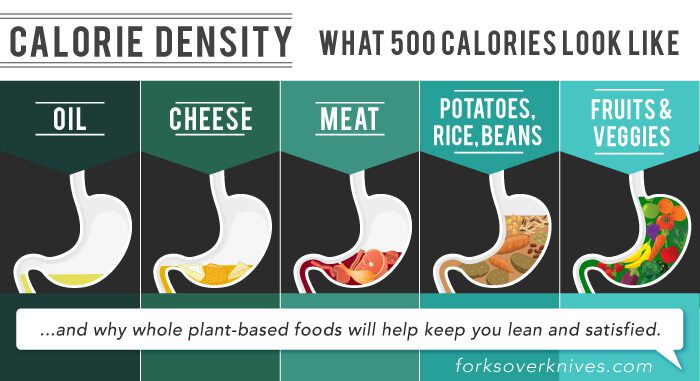A: By following the principles of Calorie Density.
I sat in on a great webinar last week - hosted by Dr. Matt Lederman - which was a much needed reminder of the Calorie Density factor of food. Have you heard about it?
Simply stated, Calorie Density is the number of calories in a given weight of food (usually one pound). So naturally, foods with a low amount of calories are considered to have a low Calorie Density, and high calorie foods have a high Calorie Density.
It's been said that a calorie is a calorie is a calorie. But, equal calorie foods are NOT the same. People continue to eat until the stomach's stretch receptors indicate fullness. Low calorie density foods (fruits, veggies, legumes, starches) will STRETCH the stomach in order to reach satiety and turn off those hunger signals at the appropriate time. But with high calorie density foods, a person will need to consume many more calories in order to stretch the stomach and reach satiety.
For example: Which would fill you up more? 2 chicken nuggets or 1.25 cups of vegetable lentil stew? Both are 100 calories. How about 2 TBS of butter versus 3 cups of grapes? Both are 200 calories.
That's why diet plans which count calories or rely on smaller portions of the same unhealthy foods don't work. The stomach isn't stretched to satiety and people feel hungry, making such diets unsustainable. Here's a great illustration of Calorie Density:

Another cool thing is that not only do we get to eat delicious foods with much fewer calories, but as Calorie Density goes down, NUTRITION goes up! Fiber, vitamins, minerals, anti-oxidants and phytonutrients abound in plant foods. The more plant foods we consume to crowd out the meat, dairy and oils, the healthier we will be!
Good News: Each day, people tend to eat the same amount of food by weight, typically 3-5 pounds of food. With every meal we eat, we get to CHOOSE what those pounds of food will contain calorically and nutritionally! We get to enjoy large and filling portions by choosing foods that are 500 - 570 calories per pound, which will shut off the hunger signals and make it easy to achieve and maintain an optimal weight. Don't restrict you food, just stop eating when you're satisfied.
Here are some other tips from the webinar (as well as my own):
- PRELOAD each meal with a salad, soup or fruit, which should constitute about half of your meal. Preloading begins the stomach stretch, resulting in 7% - 20% fewer calories per meal. Other studies confirm that simply eating an apple or a salad before a meal will cut down on the total number of calories consumed.
- The other half of the meal should include whole complex carb starches (potatoes, brown rice, corn, oats, quinoa, squash, beans and legumes). Whole grain pasta works too. These two categories of food (the fruits/veggies and the starches) can be combined once you get the hang of the half and half ratios. For example, rice with veggies or fruit, oats with berries, pasta w/roasted veggies, etc.)
- High calorie plant foods (nuts, seeds, avocado, soy foods) or slightly processed healthy foods (corn tortillas, lasagna noodles, crackers, cereals, non-dairy milks) are optional and should be limited to 1-2 per day, if at all.
- The American Cancer Institute and the World Cancer Research Fund recommend an average calorie density of 567 calories per pound.
- Americans take in about 400 calories per day from liquids (soda, juices, sweetened beverages). Drink water.
- Oils are the most calorically dense food on the planet, and the world's most obese country (USA) should not be advised to consume them! Get the added oils out of your diet. They're fattening AND health damaging. All the fats you need are supplied through eating whole plant foods.
If you'd like more information on Calorie Density, you may enjoy reading this article by Jeff Novick, MS, RD.
Any temptation you face will be nothing new. But God is faithful, and He will not let you be tempted beyond what you can handle. But He always provides a way of escape so that you will be able to endure and keep moving forward. (1 Cor. 10:13, VOICE)